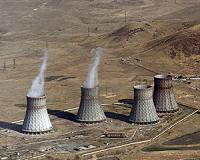 |
Brussels (AFP) March 14, 2011 Japan's nuclear emergency Monday prompted Germany and Switzerland to halt nuclear programmes as anxious Europe scrambled to review cross-border safety while safeguarding the powerful industry. With some 150 reactors scattered across the continent in half as many nuclear power plants -- some located in seismic areas -- the European Union convened emergency talks Tuesday of energy ministers, national nuclear safety officials and big nuclear companies. In Germany, where tens of thousands of anti-nuclear activists protested in a human chain this weekend, Chancellor Angela Merkel announced a three-month moratorium on plans to extend the operation of its nuclear power plants. "We cannot just go back to business as usual," Merkel said, adding that events in Japan "teach us that risks that were thought to be completely impossible cannot in fact be completely ruled out." Switzerland suspended plans to replace five ageing nuclear power plants, while Italy and Poland decided to rethink prior decisions to invest in nuclear energy. "Poland is working on a nuclear project, but events in Japan will prompt debate," Polish Environment Minister Janusz Zaleski said at a meeting with EU counterparts. In Italy, which abandoned nuclear energy in 1987, "the catastrophe in Japan is causing great concern," said his Italian counterpart Stefania Prestigiacomo. "We hope to join the European Union nuclear system but are awaiting information on the situation of plants in the EU," she added. As Japan struggled to cope with feared reactor meltdowns after a massive earthquake, anti-nuclear protests have forced governments onto the defensive, with Tuesday's talks in Brussels aimed at defining joint safety standards as well as a single approach to disaster management. Nuclear-free Austria has asked the EU for stress tests on nuclear plants. "Our neighbours are banking on nuclear energy," said Austrian Environment Minister Nikolaus Berlakovich. "We are demanding maximum safety guarantees for the Austrian people, and all of our neighbours must be able to provide the same guarantee for their citizens," he said. Most EU nations use nuclear energy, led by France with 19 plants and 58 reactors. Of the others, Britain has nine plants and 19 reactors, Germany (12 and 17), Sweden (7 and 16), Spain (6 and 9), Belgium (2 and 7), Finland (4), Hungary (4), Bulgaria (2), Greece (1), Lithuania (1), Netherlands (2), Romania (2), Slovakia (4), Slovenia (1) and Czech Republic (6). "Can they resist earthquakes? How do their reactor cooling systems function?" asked Berlakovich. Vienna slammed Berlin in late 2009 for keeping open 17 ageing nuclear plants, while Austrian environmentalists have repeatedly urged the closure of reactors in nearby Slovenia and Slovakia. France, which has the most nuclear reactors in the world after the United States, hopes to work towards harmonising safety standards across the bloc, said Environment Minister Nathalie Kosciusko-Morizet. "What's happening in Japan is undoubtedly a very serious nuclear accident," she said. "But we musn't get carried away in the EU." The minister was a weekend media mainstay in France, trying to ease concern after Paris -- with London's backing -- last month successfully wrangled a carefully worded shift in emphasis in EU energy policy, defining nuclear as a "safe and sustainable low-carbon technology" vital to climate action goals. That policy could fly out the window however in case of a nuclear disaster in Japan. French nuclear group Areva dropped 9.5 percent Monday as European stock markets reacted to growing fears over nuclear power. Areva is a major player in the world nuclear energy field, with its activities covering the whole process from the extraction of uranium to the disposal of nuclear waste. The public group is at the heart of a running debate in France over nuclear power's role in a world seeking greener, sustainable energy, with the West seeking to lessen its reliance on Middle Eastern and Russian oil and natural gas.
Share This Article With Planet Earth
Related Links Nuclear Power News - Nuclear Science, Nuclear Technology Powering The World in the 21st Century at Energy-Daily.com
 Nuclear contamination: The options
Nuclear contamination: The optionsParis (AFP) March 13, 2011 Evacuation, temporary shelter and iodine pills are the chief weapons for protecting civilians against nuclear fallout, experts say. A blast on Saturday that wrecked the concrete shell surrounding the No. 1 reactor at Japan's Fukushima nuclear plant released radioactive vapour but not at levels dangerous for human health, according to Japanese officials. Specialists say the authorities ha ... read more |
|
| The content herein, unless otherwise known to be public domain, are Copyright 1995-2010 - SpaceDaily. AFP and UPI Wire Stories are copyright Agence France-Presse and United Press International. ESA Portal Reports are copyright European Space Agency. All NASA sourced material is public domain. Additional copyrights may apply in whole or part to other bona fide parties. Advertising does not imply endorsement,agreement or approval of any opinions, statements or information provided by SpaceDaily on any Web page published or hosted by SpaceDaily. Privacy Statement |